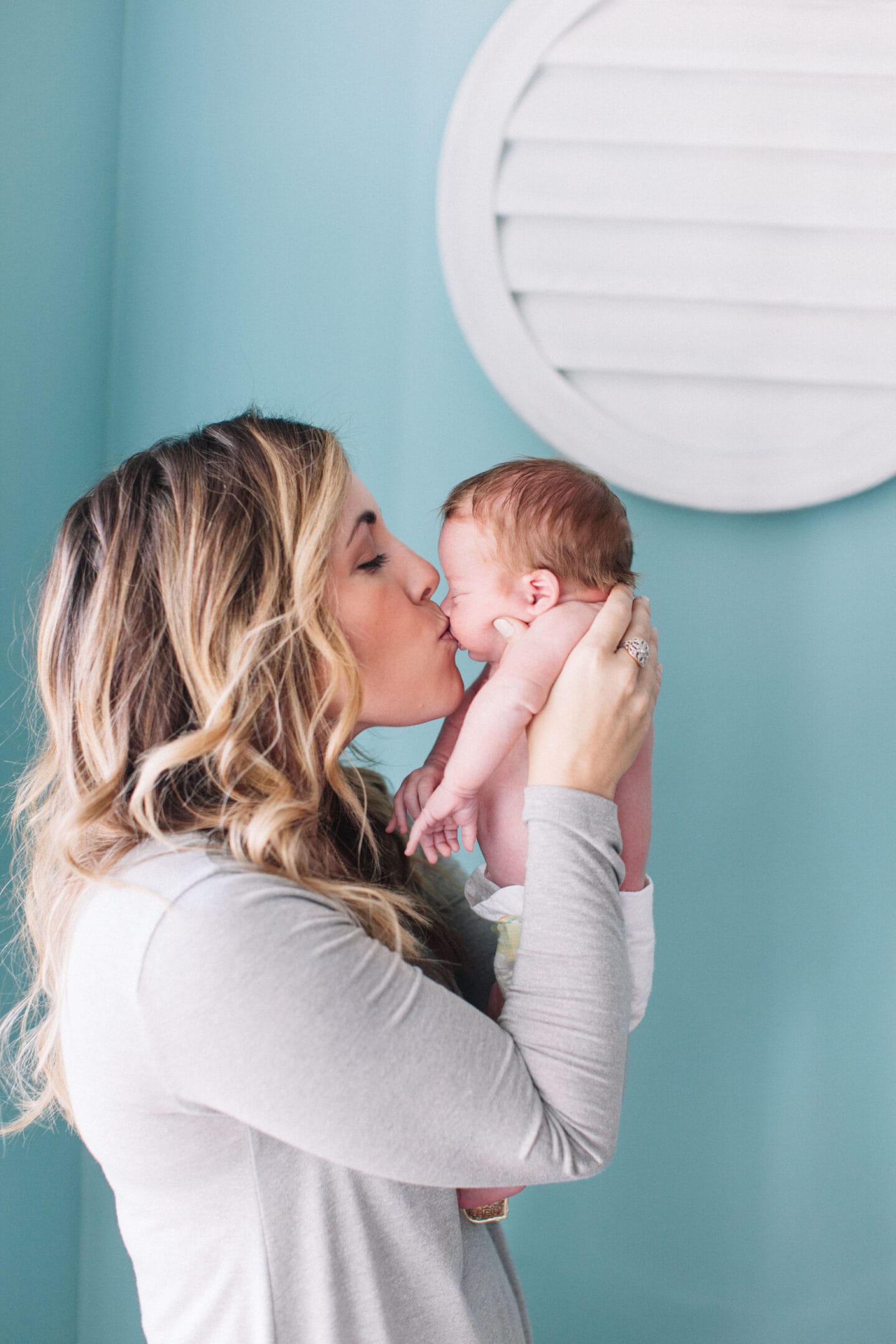This newborn sleep guide is designed to help your new baby sleep during those first few weeks of life… and to help you sleep, too!
Disclaimer: this post contains affiliate links.
Recently I was approached by the physician assistant at our pediatrician’s office about helping them update their materials to give to patients.
I was pretty excited for some updated info…and honored to be asked to contribute!
As all of you know, I’m a “Babywise Mom.” I read the book.
The first thing she asked me to write was a quick-reference sleep guide for new parents. I remember being a new mom. I felt CLUELESS.
I would have loved to have gone to my baby’s first dr visit and be given some good tips on helping him to sleep from the start. I tried to channel that inner-first-time-mom when writing this guide and, so far, she’s had great responses from the new parents she gives them to.
It was tricky to make a one-page guide for a topic I’m so passionate about!
The following suggestions in this newborn sleep guide will help establish good sleep habits for your baby.

Newborn Sleep Guide 101: How Much Does Two Week Old Babies Sleep?
A “newborn” is considered a baby under 2 weeks old. Newborns sleep A LOT. On average, two week old babies and younger will sleep 16-20 hours a day. Of course, that time is broken up by frequent feedings and a little bit of awake time.
By following these guidelines most babies will naturally fall into a 3-hour schedule by the time they are 2 weeks old and will be on the path towards sleeping through the night!

Want More from a Keepin’ It Real Babywise Mama?
Newborn Sleep Guide: Feeding
Feed on Demand
For the first two weeks be sure to feed your baby on demand, with a maximum of 3 hours between feedings.
That time measures from the start of one feeding to the start of the next feeding. Wake your baby if you need to in order to feed them at the 3 hour marker.
Many babies will want to eat even sooner than that! A newborn should be eating at least 8 times in a 24 hour period.
Focus on Full Feedings
Keep your baby awake! Tickle the feet, do skin-to-skin, do whatever it takes to get them eating during feeding times.
A full feeding should typically take around 40 minutes (20 per side on average).
This takes time and practice; don’t become frustrated if it’s difficult to keep your baby awake to eat!
—> See tips for keeping sleeping baby awake here!
Start the Eat-Wake-Sleep Cycle
Right when your baby wakes, feed them.
Then have them stay awake during the feeding and for a few minutes following the feeding (usually this will only be long enough for a quick diaper change) then put them right back to sleep again.
Most newborns can only handle 30-60 min total awake time, which includes the time it takes for their feeding.
—-> Bottle or Breast? Here are the REAL pros and cons of each!
Ready to Sleep Train Your Baby? Want to Get Started with Babywise But Not Sure How? Be sure to Sign Up for my Exclusive Email Series HERE:
Newborn Sleep Guide: Sleep
Put Baby DOWN to Sleep
Try to limit holding the baby while sleeping. Put the baby in their crib or bassinet to sleep. This will help them get used to sleeping on their own and will create a better sleeper from the start!
Swaddle Baby for Sleep
There are many different types of swaddles available. Swaddle your baby at each nap and at nighttime sleep.
This mimics the womb and will help them sleep more solid.
—-> Find the best items for baby sleep here!
Avoid Sleep Props
When considering introducing a sleep prop, such as a pacifier, think long term. Are you going to be ok with reinserting the pacifier several times a night for many months?
It’s also important to feed a newborn on demand and using a pacifier will make it more difficult to tell when the baby is hungry.
Part of sleep training is helping a baby to learn to self soothe and a pacifier will quickly become a “must have” item for sleep rather than the baby being able to sleep on their own.

Newborn Sleep Guide: Other Helpful Tips
Avoid Gassy Baby
If your baby is crying and holding their legs up then they are probably gassy.
Gas is the typical cause for sleep problems in a newborn.
Be sure to burp well, offer gas drops if needed, and pump their legs to help relieve gas pains.
Visiting a local chiropractor can also be very helpful.
Provide White Noise
Have some sort of white noise in the baby’s room to help them sleep and to help block out other sounds of the house.
A box fan works great and is an inexpensive option!
Consistent Sleep Conditions
Have your baby sleep in the same place for each nap and at night. Be sure the room is dark (blackout curtains work wonderfully).
Teach The Difference Between Night and Day
Help your baby learn when it’s time to sleep and when it’s time to be awake by keeping the
house bright and comfortably noisy (talking etc) when the baby is eating.
When it’s time for sleep be sure to have it dark and quiet.
Want an easy-reference printable of the tips in this post? Purchase here:
Newborn Sleep Guide: Taking Care of Yourself
Rest and limit housework. Focus on taking baths and sleeping and caring for your new baby!
This will help you recover quicker and also benefit your baby, as you will be able to provide for them at your very best!
If you are looking for more help with newborn sleep I wrote this post on starting Babywise from birth.
What are some tips you would recommend to a new parent when it comes to sleep training?
- 10th Birthday Message For My Daughter Love Mom {Tess’s 10th Birthday Letter} - June 12, 2025
- Tips to Maintain Structure While Traveling with Kids - May 22, 2025
- A Letter to my Son on His 16th Birthday From Mom (Kye’s Bday Letter) - April 30, 2025







Hi Emily! I have a 10 day old and I feel like I’m barely making it everyday. I do plan on starting a sleep schedule once we are out of this newborn stage (I just ordered a copy of Babywise after learning about it here). However, I am currently struggling with daytime naps.
Everything I’ve read (including here) is that newborns should only have 30-60 minutes of awake time at this stage. My baby stays awake for 3-4 hours at a time. I’m so confused! Everyone says babies sleep all the time so I’m struggling (usually ending up in tears) when he won’t go down.
I keep seeing “awake time” ideas around the internet saying tummy time, staring at faces, rocking in chair, etc. This is the first blog I’ve read where you say awake time can literally just be feeding, burping, changing and then put baby back down. So now I’m thinking maybe I have been overstimulating baby when I should be just putting him down after 30-40 minutes of feeding routine? Maybe those “awake time” activities are for a baby a little older?
I guess what I’m hoping for is a little more information on how you handle “awake time” from 0-2 weeks. Do you ever do the above mentioned “awake time” activities during this newborn period? Is this still the “awake time” guidelines you typically follow during the evenings when you will be putting them down for bed in a couple hours?
So confused! And at my wits end 🙁 Thank you!
Author
Hey Alicia!
Girl YES you have an overstimulated baby on your hands 🙂
Cut out ALL activities. At this age “awake time” is truly just feeding, quick diaper change and back to sleep!
Overtime awake times get extended and baby starts eating faster but the awake time starts as soon as the baby is awake so eating is part of the time. diaper change is part of that time. burping is part of that time. Even just those three things are stimulating for a little one at this age!
It sounds crazy but the less awake time a baby has, the better they sleep.
It will take a bit of time to adjust to putting him down sooner but it WILL help! For sure! I’m positive! I don’t do ANY of those awake time activities at this age. None. At around 3 weeks I MAY started putting them on a playmat for a few minutes and do some tummy time for a few minutes too but not until the routine is well established. I have TONS of sample schedules throughout my blog you may also find helpful! Hope this helps too 🙂